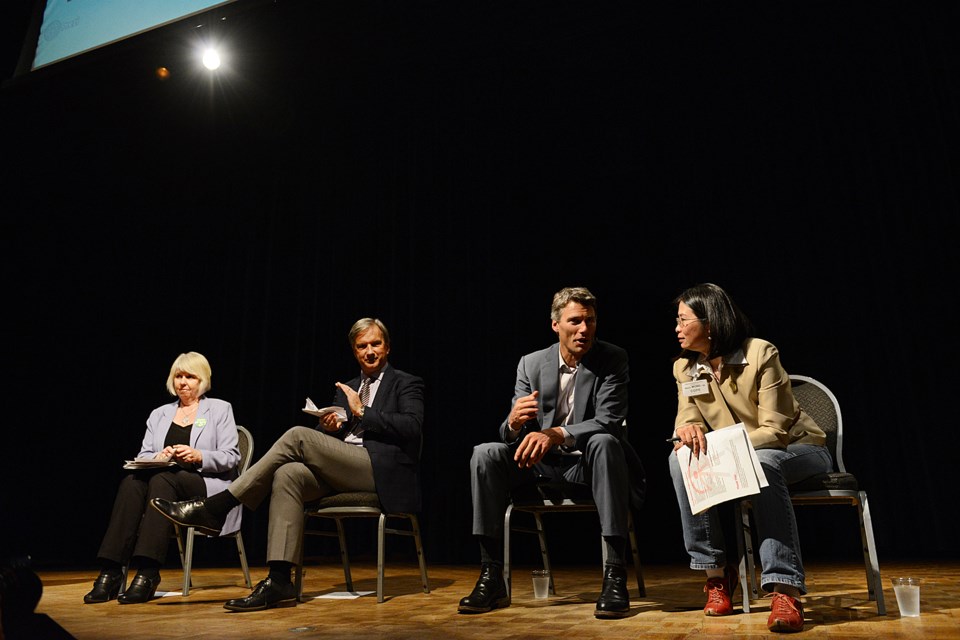So Mayor Gregor Robertson wants a so-called living wage in Vancouver.
He announced this via an email sent Monday to us media types.
It’s news, and it isn’t.
It’s news if you didn’t know he already committed to do this during the 2014 civic election campaign.
In fact, when he announced his support for a living wage at a candidates’ meeting in October at the Italian Cultural Centre, Robertson wasn’t the only one to commit to the policy. Also on board were Green Party Coun. Adriane Carr and mayoral candidates Meena Wong of COPE and Kirk LaPointe of the NPA.
All four agreed to work with the Metro Vancouver Alliance, an energetic organization of faith groups, labour unions and community advocates, to develop a living wage. None of the candidates went into great detail on how they would do that; the format didn’t really allow for it.
But Robertson won the election and now we’re getting some details.
First, an explanation of what a living wage is.
It is the amount of money wage earners living in a household pay for basic expenses such as rent, food, transportation and child care. That’s once government taxes, credits, deductions and subsidies have been taken into account. It does not include pension savings, debts or many other of what Robertson’s staff calls “routine expenses.” These would include saving for retirement, saving for emergencies, saving for education, anything beyond minimal recreation and the cost of caring for a disabled, ill or elderly family member.
In Metro Vancouver, which stretches from West Vancouver to Langley, it is estimated both wage earners in a four-person family must earn $20.68 each per hour to meet the definition of a living wage. That’s 58 cents more per hour than the 2014 estimate.
Here’s a quote from Robertson of the Captain Obvious variety: “Vancouver has one of the strongest economies of any city in Canada, but too many families are struggling to make ends meet. Full-time work should provide families with a basic level of opportunity and economic security.”
So you might be wondering who the heck comes up with all these numbers. That would be the Canadian Centre for Policy Alternatives, which released a report in April that settled on the $20.68 per hour wage. Now the Living Wage for Families Campaign wants that wage implemented in Metro Vancouver.
Here’s a different take on Robertson’s quote from Deanna Ogle, the organizer for the campaign (note her description of the economy): “Thanks to the combination of a low-wage economy and lack of government supports, many families are struggling to make ends meet.”
I spoke to Ogle Monday and she’s happy Robertson will introduce a motion at next week’s council meeting to ask city staff to report back on steps necessary to have the Living Wage for Families Campaign certify Vancouver as a living wage employer.
To be clear, Robertson isn’t asking for a city-wide implementation of a living wage, which would likely ignite a revolution – both from the business owners who wouldn’t want to pay it, and the activists who would say it’s about time.
No, as Ogle explained, Robertson wants a living wage for certain city employees and contractors. But many, I argued, would be earning this already as union employees. Last time I checked, city workers make a decent living.
“But there are a number of folks who are employees who don’t make a living wage,” she said, but didn’t have an exact head count. “There’re folks who are working in the libraries who don’t make a living wage, there’re people who are events staff who don’t make a living wage. We know that there are contracted cleaners, for example, who are cleaning firehalls. And they’re doing important work.”
So how much would this cost to implement?
That’s what a staff report will determine but Ogle noted the City of New Westminster, which became in 2011 the first city in Canada to implement a living wage, spends a quarter of one per cent of their annual budget to meet the wage scale. And that increase, she added, didn’t require a tax hike.
Sounds, though, like it will be complicated to get it off the ground.
“It’s not an overnight process because they have to talk to the unions that are involved and also talk to their contractors,” Ogle said. “So we’re looking at a multi-year process.”
In the meantime, good luck everybody.
@Howellings



